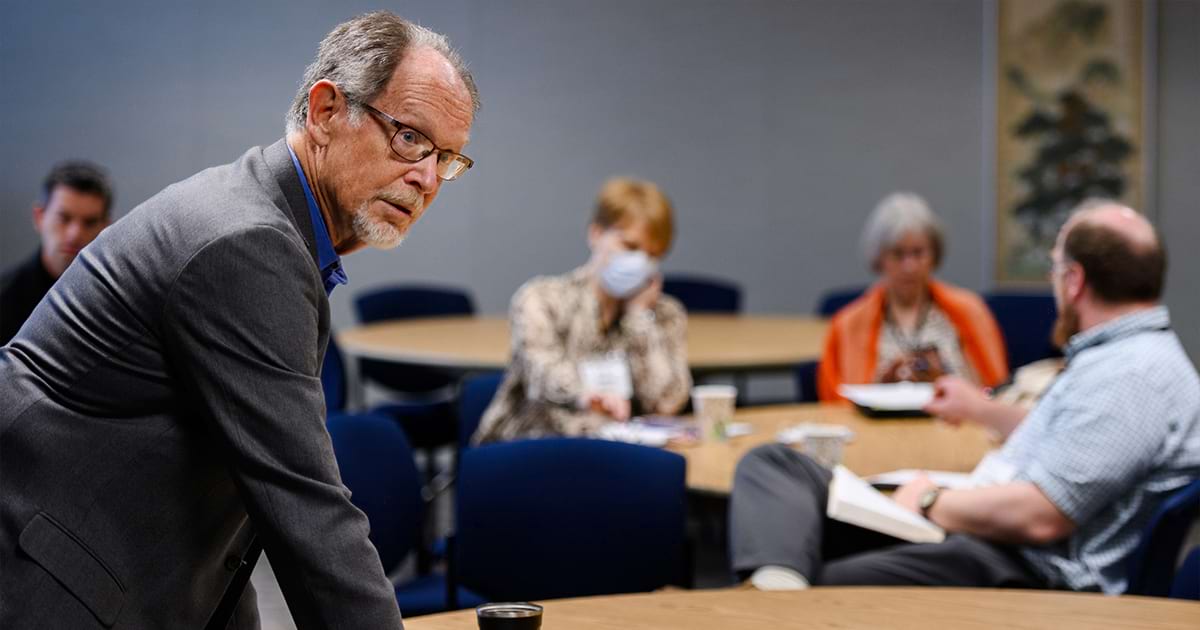
By Cheryl Magness
The Lutheran Church—Missouri Synod (LCMS) Specialized Spiritual Care Ministry is dedicated to bringing the Gospel to those in unique circumstances: people who are hospitalized, disabled or imprisoned; seniors and their caregivers; the doctor on call and the firefighter keeping watch. In these specialized settings, Specialized Care workers extend their congregation’s Word and Sacrament ministry by providing spiritual care to the faithful and bearing witness to the unchurched.
On May 6 and 7, LCMS Specialized Spiritual Care Ministry held its 2024 conference at the LCMS International Center in St. Louis. The agenda included a panel discussion with the Rev. Dr. R. Lee Hagan, president of the LCMS Missouri District, and the Rev. Dr. Allan Buss, president of the LCMS Northern Illinois District, along with additional sessions on topics such as fire department chaplaincy, disaster response chaplaincy, confessional chaplaincy in a pluralistic setting, liturgical participation and memory care, and the promises of the Gospel applied to chaplaincy work. In addition, attendees heard an update from the LCMS Office of National Mission (ONM) — which includes Specialized Care — and enjoyed opportunities for fellowship and worship.
Going where the people are
ONM Executive Director Rev. Daniel Galchutt brought greetings from the ONM and talked about how, although people often associate the word “mission” with something far away, those serving in specialized situations know “the mission field is all around us.” Reading from Mark 5 about Jesus’ healing of the man possessed by demons, Galchutt pointed out that after the man was healed, he did not go with Jesus but returned home: “As he [Jesus] was getting into the boat, the man who had been possessed with demons begged him that he might be with him. And he did not permit him but said to him, ‘Go home to your friends and tell them how much the Lord has done for you, and how he has had mercy on you.’ And he went away and began to proclaim in the Decapolis how much Jesus had done for him, and everyone marveled” (Mark 5:18–20).
Galchutt cited several statistics showing the decline of church affiliation and attendance. “That’s why the work you do is so very, very important — because we’ve got to go to [where people are]. … That’s why I thank God for you and the work you do.”
During the panel discussion, both Buss and Hagan shared some of the ways their districts seek to care for workers, both ordained and lay, and to facilitate networking among those who do similar kinds of work. Buss asked attendees, “How can we help you?” and received several responses from the group. Later, Hagan said that sometimes the church can forget to thank its workers. He said that church workers “don’t do it for the thank-yous” but that it is still important for them to hear the church express its gratitude: “You are a blessing to the church. We give thanks to God for your service, and we pray that God would continue to bless.” Buss echoed Hagan’s words: “You are bringing the light and hope of Jesus. … Whether you’re called, ordained, commissioned or lay, you have a valuable part of [this work].”
Finishing the story
In his presentation, titled “Resurrection Gospel and Spiritual Care: Promises that Emerge if You Finish the Story,” the Rev. Dr. Jeffrey Gibbs, professor emeritus at Concordia Seminary, St. Louis, credited his own chaplaincy experience — a “formative” and “intense” summer unit of CPE (Clinical Pastoral Education) at a hospital in Houston when he was a seminarian — with helping him gain greater self-awareness and teaching him how to listen. But after acknowledging that those present had far more experience in chaplaincy roles than he — “You don’t need me to tell you how to do chaplaincy” — Gibbs said he wanted to focus instead on the “what”: the story of salvation, which promises the hope so sorely needed by both specialized workers and those in their care.
Gibbs said that many Christians, when they tell or think about that story, tend to stop with Jesus’ death on the cross as He suffered the punishment for the sins of all people or with the believer’s soul entering the presence of God at the time of his or her bodily death. Both of these things are true, Gibbs said, but they aren’t the end of the story. By looking to Christ’s resurrection — and ultimately our own, when Christ will return (1 Thess. 4:16) and our perishable bodies will “put on the imperishable” (1 Cor. 15:53) — we find the hope that comes from knowing how the story ends.
Conference attendee Margaret Whitsett, a deaconess from Louisville, Ky., who serves in both a congregation and a care facility, said that after several years of connecting with her fellow Specialized Care workers “only via Zoom,” it was “a delight to be in person, to worship together, to reflect, network, reconnect, encourage.” She appreciated the opportunity “to get a sense of Lutherans in specialized ministry in diverse places” and to hear from Hagan and Buss about the importance of communicating with one’s district president. She also appreciated the conference’s theological content.
“Tuesday was theology day,” Whitsett said, “with a brain-stretching presentation by [the Rev. Dr.] Jared Yogerst on liturgical participation — which I understood to remind us that, even as God comes to us, so we go out into the world and meet other ‘beloveds.’ And Professor Jeff Gibbs extended that with a reminder that we bring Christ [to those beloveds] — crucified, risen, ascended and returning. These are good reminders for me.”
Learn more about Specialized Spiritual Care Ministry at lcms.org/specialized-care.
Posted June 28, 2024